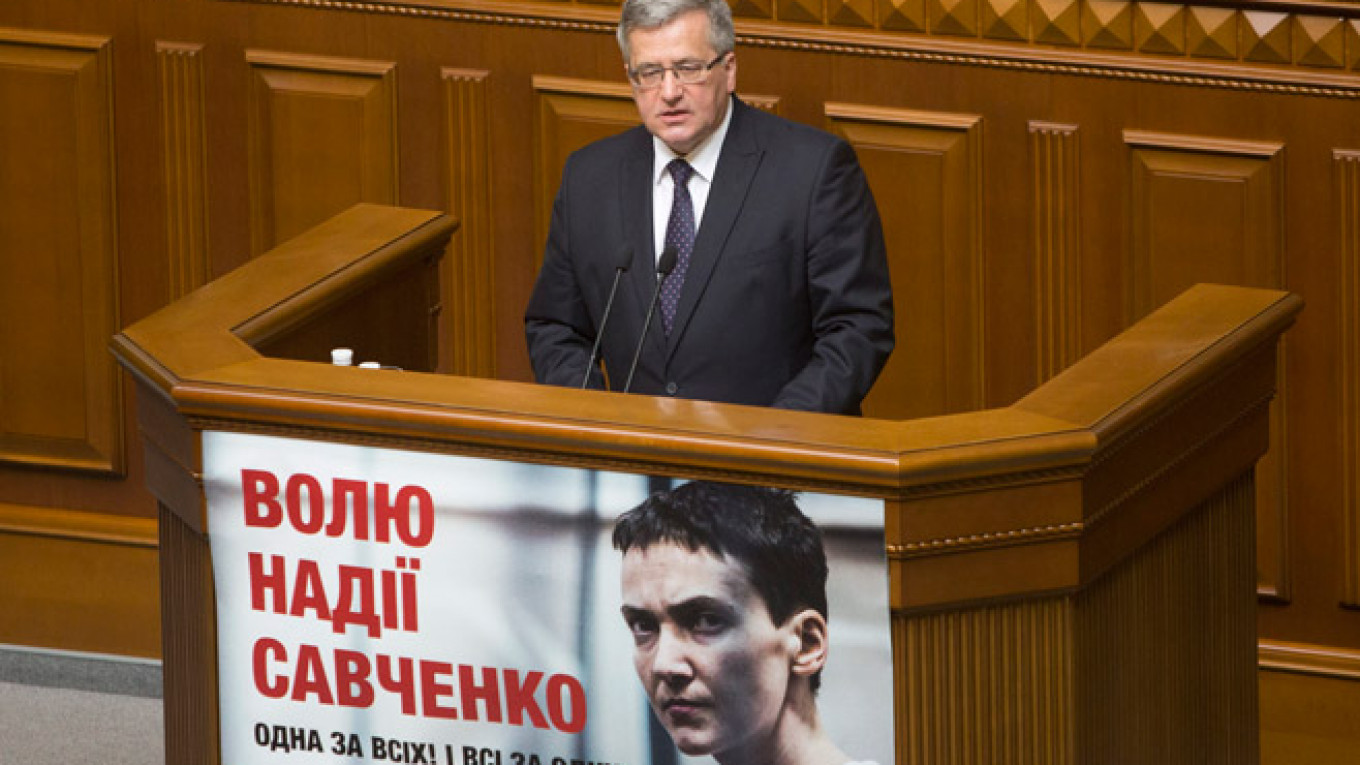UNITED NATIONS — The mother of a Ukrainian helicopter pilot imprisoned in Russia is on a global campaign seeking support from world leaders to pressure President Vladimir Putin to free her daughter.
Nadezhda Savchenko was captured by a pro-Russian militia and has been in Russian custody since June 2014 on charges that she was involved in an attack that killed two Russian journalists who were covering the war between Ukrainian troops and Russia-backed separatists in eastern Ukraine. At the time of the attack, the 33-year-old pilot was serving with the Aidar volunteer battalion that was fighting alongside government forces near the eastern city of Luhansk.
Maria Savchenko launched her global campaign in Germany, where she pleaded for help from lawmakers and wrote Chancellor Angela Merkel a letter to help "bring Nadiya back home to Ukraine," using her daughter's Ukrainian name. New York is her second stop and she was due to meet Tuesday with UN Assistant Secretary-General for Human Rights Ivan Simonovic.
Savchenko's mother said in an interview with The Associated Press on Monday that her daughter is a political prisoner and Russian prosecutors have provided "no evidence" that she provided guidance for a mortar attack that killed two Russian state television journalists at a checkpoint in eastern Ukraine, as Moscow claims.
Russia's UN Mission, asked to comment on Maria Savchenko's claims and criticism, said: "She is accused of a serious crime as an accomplice in the killing of two Russian journalists."
Savchenko's mother attended a rally Sunday near Russia's UN Mission where about 100 people signed a petition to presidential candidate Hillary Clinton asking for her assistance to get Nadiya released. She said her next stop will be Paris and then all European countries.
"I'm a desperate mother who is ready to travel the globe to make everything possible that my message be heard," said Savchenko, who is 78. "I call upon all international leaders to help me to bring my daughter back home."
She said she wrote Putin a letter saying, "I know that you have children and you have a mother. Well, I am a mother and you should have at least one percent of compassion to my girl who is now in prison under absolutely artificial pretexts."
Maria Savchenko called Putin "a terrible person" who acts like the professional KGB officer that he was, and accused him of holding Nadiya as a hostage to "exchange for some favors" at a future date.
Nadiya spent 83 days on a hunger strike to protest her detention, but under pressure from her family and supporters she started drinking milk and eating cheese in March. Though her weight has dropped from 78 kilograms (172 pounds) to 53 kilograms (117 pounds), her Russian lawyer, Mark Feigin, who saw her last week, said she is in much better physical condition than she was a few months ago.
Feigin, who is traveling with Savchenko's mother, said Nadiya's preliminary trial has been going on in Moscow and her defense team expects that by the end of the summer the court will present its verdict. He said he has tried unsuccessfully to get the charges against her dropped for lack of evidence, including presenting cellphone records showing "she was kidnapped two hours before the journalists were killed."
Since her arrest, Nadiya has been elected as a deputy in Ukraine's Parliament and is a delegate to the Council of Europe, giving her diplomatic immunity, "but everything is ignored by Russian justice," he said.
Feigin said the only option left for him, as her lawyer, is to call her a "prisoner of war."
A Message from The Moscow Times:
Dear readers,
We are facing unprecedented challenges. Russia's Prosecutor General's Office has designated The Moscow Times as an "undesirable" organization, criminalizing our work and putting our staff at risk of prosecution. This follows our earlier unjust labeling as a "foreign agent."
These actions are direct attempts to silence independent journalism in Russia. The authorities claim our work "discredits the decisions of the Russian leadership." We see things differently: we strive to provide accurate, unbiased reporting on Russia.
We, the journalists of The Moscow Times, refuse to be silenced. But to continue our work, we need your help.
Your support, no matter how small, makes a world of difference. If you can, please support us monthly starting from just $2. It's quick to set up, and every contribution makes a significant impact.
By supporting The Moscow Times, you're defending open, independent journalism in the face of repression. Thank you for standing with us.
Remind me later.






